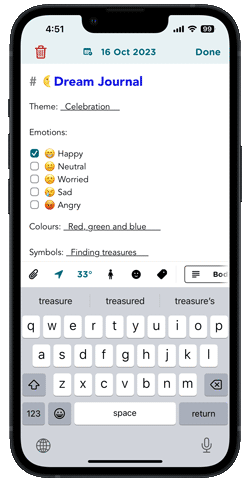What is a Dream Journal?
Keeping a dream journal can be a fascinating and enlightening experience. Dreams are a reflection of our subconscious mind and can provide valuable insights into our emotions, thoughts, and desires. Moreover, keeping a dream journal can help improve your dream recall, enhance your creativity, and even aid in problem-solving. In this article, we will explore some helpful tips, prompts, and templates to help you in starting and keeping your dream journal.

Benefits of keeping a dream journal
Keeping a dream journal or diary can open a doorway to understanding and harnessing the power of your subconscious mind. We will explore the numerous benefits of keeping a dream journal, including improved dream recall, enhanced self-reflection, heightened creativity, and improved problem-solving abilities.
1. It helps you to remember your dreams are about and improve your memory
Dreams are very short-lived. The longer time has passed since waking up, the harder it is for you to recall what you had dreamt about. It will be easier for you to remember what you dreams were about if you write about them immediately after waking up. Recalling dreams also serves to improve your memory.
2. You get to understand yourself better
Your subconscious mind is largely untapped, yet it contains information related to us. When you dream, you’ll be able to discover secret gems that you never thought existed. Once you begin journaling, if you work on what you discovered, you’ll transform into a better version of you.
3. It helps you understand your emotions and thoughts
Having a positive and good dream the night before may lead to you waking up in a happy and optimistic mood but the converse holds true – waking up after a nightmare could make your day more dull and sad. By chronicling your dreams, you will be able to understand why you feel the way that you do each day.
4. It can helps to induce lucid dreaming.
Lucid dream is one in which the dreamer is aware that they are dreaming. People are attracted to lucid dreaming because they can do things in their dreams that they never could in reality. For lucid dreaming and dream recalling to work, a dream journal is a must-have!

5. It can help you to improve your problem-solving skills.
Studies show that we are more intelligent when our minds are well rested. Our mind puts together puzzles in our subconscious while we are asleep and dreaming. When we keep a dream journal, it gives us a better insight and understanding of solving hurdles in our life.
How to write a dream journal?
1. Sleep with an intention to remember
If you don’t usually remember your dreams, you need to tell your subconscious self to remember them. You can write it in your own words somewhere, such as on your journal software. When you wake up the next day, think about what had happened in your dream and tell yourself not to let the dream drift away from your memory.

2. Calm down
Some might feel nauseous after waking up from a dream while others might feel their heart race after having an intense dream. So calm down and take a deep breath before you start writing.

3. Recall and pen down the scenes that were in the dream
Before you forget what happened in the dream, record it in detail on the scenes that you have experienced. Some of which could be your thoughts on the event, your emotions and reaction to the occurrence, the activities that happened and/or anything that you find unique and interesting that you felt that you need to remember.
Tips for keeping a dream journal
1. Choosing a journal
When starting a dream journal, you can consider using a physical notebook or a digital dream journal app such as Journey. Writing by hand allows for a deeper connection to your dreams and encourages focus and reflection. Select a journal that speaks to you, perhaps one with an inspiring cover or blank pages that invite creativity.

2. Making it a habit
Develop a routine for recording your dreams. Place your journal and a pen by your bedside as a reminder to jot down your dreams as soon as you wake up. Dreams are fleeting, and capturing them immediately can enhance dream recall. Aim to write in your dream journal at least three times a week or every time you recall a dream.
3. Setting the Scene
Enhance your dream recall by creating a conducive environment for dreaming. Keep your bedroom free of distractions, such as electronics or excessive noise, to promote restful sleep. Engage in relaxation techniques, such as deep breathing or meditation, before bed to calm the mind. Creating a calming bedtime routine can also help set the stage for memorable dreams.
Dream journal prompts
Sometimes, it can be challenging to begin writing about a dream. Consider using prompts to jumpstart your entries. Here are a few examples:
- "Last night, I dreamt about..."
- "The most vivid part of my dream was..."
- "In this dream, I felt..."
- "The setting of my dream was..."
- "If this dream had a message, it would be..."
Dream journal templates
Starting a dream journal can be an exciting journey into the depths of your subconscious mind. As a beginner, it may feel overwhelming to capture all the details and decipher the hidden meanings behind your dreams. That's where dream journal templates come in handy. These pre-designed formats provide structure and guidance, making it easier for you to record and analyze your dreams.
Date: Start each dream entry with the date to track your progress and identify patterns over time.
Title: Give your dream a title that captures its essence or key theme. Description: Provide a brief summary of the dream, highlighting the main events, symbols, and emotions.
Analysis: Reflect on the meaning of the dream and any connections to your waking life. Consider what the dream may be trying to communicate or what lessons it might hold.
Emotions: Jot down the emotions you experienced during the dream and how they may relate to your current emotional state or subconscious concerns.
Symbols: Identify any significant symbols or objects from the dream and explore their potential meanings. Symbols can often provide valuable insights into your unconscious thoughts and desires.
Action Steps: Based on your analysis, consider any actions or changes you might take in your waking life as a result of your dream's message.
If you are looking for a dream journal template, you can access Journey's journal template library, which offers hundreds of pre-filled journal templates.

- Open the Journey app on your device.
- Navigate to the Coach section.
- Look for the dream journal template option. It may be labeled as "Dream Journal Template" or something similar.
- Click on the dream journal template to open it.
- The date of the dream will be the date when you created this entry. This will help you keep track of the dreams over time.
- Identify the dream theme. Reflect on the main subject or topic of your dream and write it down in the designated section of the template.
- Record the emotions you experienced in the dream. Focus on the predominant feelings you felt during the dream and note them down.
- Pay attention to any colors that stood out in your dream. Write down the colors you remember and associate them with specific elements of the dream.
- Identify any symbols that appeared in your dream. Note down any objects, animals, or abstract symbols you recall and their potential meaning or significance.
- Reflect on any people who were present in the dream. Write down the individuals you remember, whether they are familiar to you or strangers.
- Write a detailed description of the dream itself. Capture as much detail as possible, including the setting, events, and any other relevant aspects.
- Take a moment to interpret your dream. Based on your knowledge, intuition, or any resources you use, try to uncover the potential meaning behind the dream elements.
- Once you have completed filling out the dream journal template, remember to save your entry.
A dream journal is an invaluable tool for anyone interested in exploring the depths of their subconscious mind. It serves as a dedicated space to capture and reflect upon the intricacies of our dreams. By consistently recording our dreams, we enhance our capacity to recall and analyze them, unveiling hidden meanings and patterns that can offer valuable insights into our inner workings. From exploring the realm of emotions and colors to deciphering symbols and interactions with people, a dream journal allows us to delve into the rich tapestry of our dreamscapes. Moreover, it facilitates self-reflection, creativity, and problem-solving abilities by encouraging us to engage with the abstract and intriguing realm of our unconscious experiences.
As we embark on this journey of self-discovery, a dream journal stands as a faithful companion, documenting our nocturnal adventures and aiding us in unlocking the secrets of our minds. So, grab a pen and a blank notebook, or utilize the convenient templates offered by digital apps like Journey, and embark on the captivating voyage of self-exploration through the art of dream journaling. Your dreams await, eager to be unraveled, understood, and cherished.